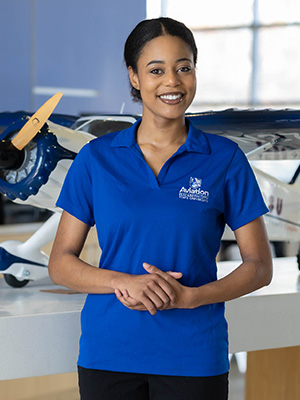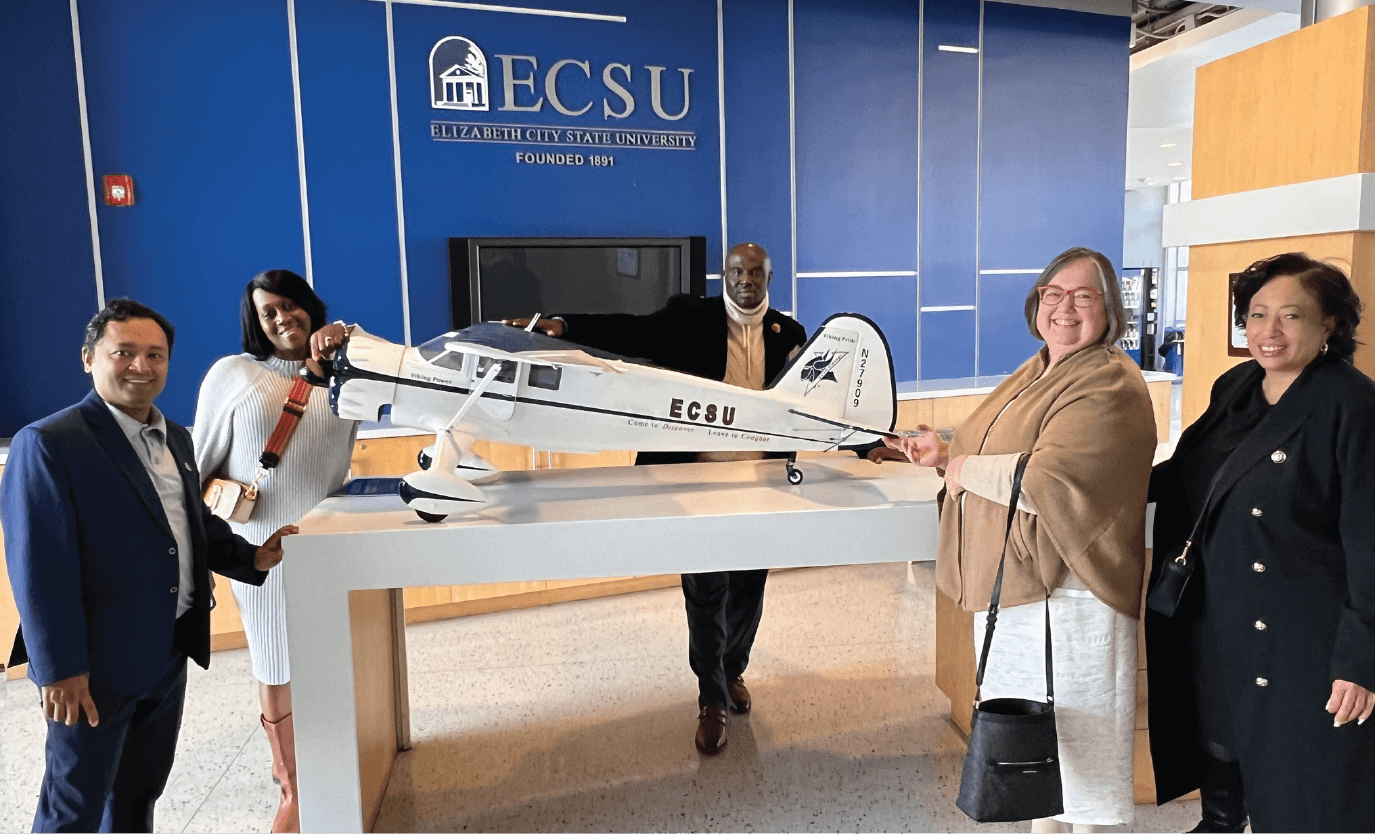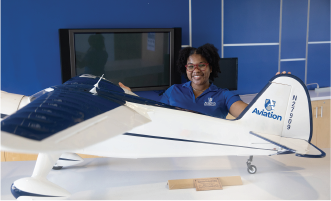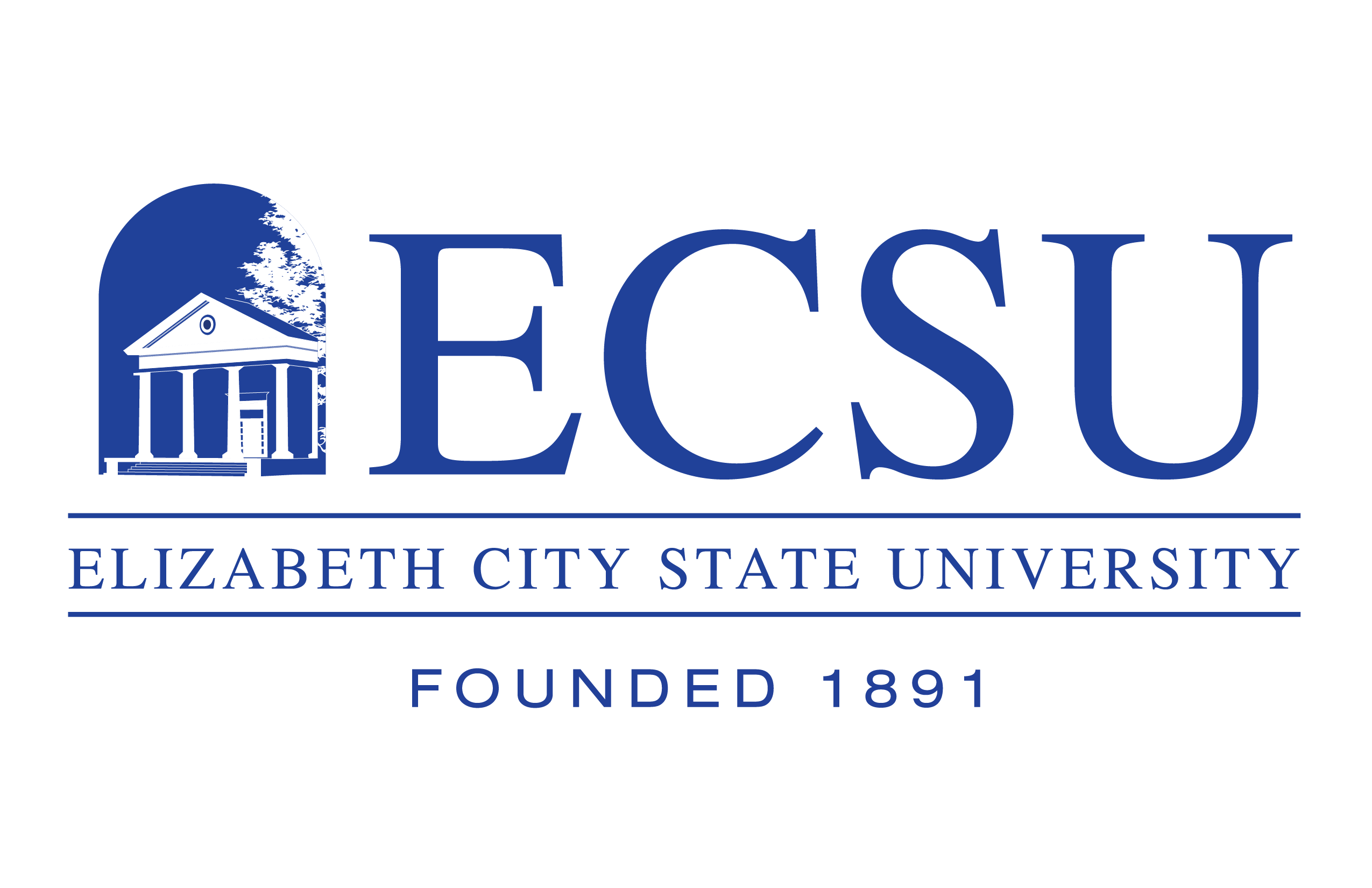Find Your Passion with an Aviation Science Degree | ECSU



aviation sciences PROGRAM OVERVIEW
Soar to new heights in your career at the only four-year collegiate aviation education program in North Carolina.
The airline industry supports more than 65 million jobs worldwide, making it one of the world’s largest employment sectors. Our aviation programs can help you find your calling in this diverse field.
With an airport just 1.5 miles away from the heart of our campus, you’ll have easy access to hands-on experience at working aviation facilities. We also offer two majors to choose from and a wide array of concentration areas, including unmanned aircraft systems. You’ll graduate with the skills you need to start the career you want in aviation.
Note: Aviation Management is very popular with transfer and non-traditional students so the graduation rate does not accurately reflect the popularity of the program.
Graduate Employment
ECSU Aviation Management graduates have been most successful finding employment in various fields of the aviation industry. The solid aviation foundation found throughout the curriculum makes these graduates flexible and highly sought after. Several have entered governmental and civil services as well as most branches of U.S. Department of Defense service and since 2015 three (3) have opted for flight billets. Other ECSU aviation management graduates are customer service representatives for major airlines, both land and airside airport/line operations specialists for small, mid-size, and large airports. Graduates also have found positions as aviation technical publication writers, aviation logistics coordinators, as well as dispatching and scheduling and even as the manager of a small local airport.
NIFA National Intercollegiate Flying Association: The National Intercollegiate Flying Association was formed for the purposes of developing and advancing aviation education; to promote, encourage and foster safety in aviation; to promote and foster communications and cooperation between aviation students, educators, educational institutions and the aviation industry; and to provide an arena for collegiate aviation competition.
Aviate (United Airlines Pilot career development program): Aviation Science flight students can now apply to join United’s Aviate program and prepare for a structured career pathway path leading to potentially becoming a United Airline pilot. By partnering with United Airlines, ECSU aviation students will gain access to:
- A direct path to United. Aviate participants transition to United as a First Officer upon successful completion of the Aviate program and hiring requirements;
- Travel privileges. Aviate participants enjoy travel privileges to hundreds of United destinations;
- ECSU students participating in Aviate program will be paired with United pilots, creating a structured format for critical leadership and career development opportunities for ECSU students;
- ECSU students will have opportunities for professional development events and programs providing a breadth of resources to learn and grow throughout the Aviate network.
Women in Aviation International (WAI): Women in Aviation International (WAI) is a nonprofit organization dedicated to the encouragement and advancement of women in all aviation and aerospace career fields and interests. Our diverse membership includes astronauts, pilots, maintenance technicians, engineers, air traffic controllers, business owners, educators, journalists, flight attendants, high school and university students, air show performers, airport managers, and many others. We are dedicated to: investing in our current and future workforce, developing an inclusive and sustainable aviation and aerospace industry, and inspiring girls to pursue careers in aviation and aerospace.
Alpha Eta Rho (AHP) is a professional collegiate aviation fraternity founded in 1929 to bring together students that have a common interest in the field of Aviation. Membership is open to all collegiate men and women who have a strong interest in any career within the aviation and aerospace industry. AHP is the oldest aviation organization on college campuses today!
The Southeast Chapter of the American Association of Airport Executives (SEC-AAAE): With more than 600 members, the Southeast Chapter is the largest chapter of the American Association of Airport Executives. This chapter represents twelve states as well as the Virgin Islands and the District of Columbia.The association is guided by a nine-member Board of Directors and an Executive Secretary.
University Aviation Association (UAA): The University Aviation Association (UAA) is the voice of collegiate aviation to our members, the industry, government and the general public. Through the collective expertise of our members, UAA plays a pivotal role in the advancement of degree-granting aviation programs that represent all segments of aviation. Today, UAA is comprised of over 1200 members from more than 220 colleges and universities in the U.S., Canada, Australia, Europe, and Asia. The organization and its members are poised to meet the ever-changing needs of the aviation industry and address the challenges of the 21st century.
National Business Aviation Association (NBAA): Founded in 1947 and based in Washington, DC, the National Business Aviation Association (NBAA) is the leading organization for companies that rely on general aviation aircraft to help make their businesses more efficient, productive and successful. The association represents more than 11,000 companies and professionals, and provides more than 100 products and services to the business aviation community, including the NBAA Business Aviation Convention & Exhibition (NBAA-BACE), the world’s largest civil aviation trade show.
Aircraft Owners and Pilots Association (AOPA): AOPA is the beacon for those who cherish the freedom to fly. It demonstrates what is possible when a determined organization listens to its members, collaborates with its colleagues, finds solutions with its partners in government, and focuses its resources—all to secure the future of General Aviation. AOPA’s success is proof that the public good can be served while individual freedoms are preserved.
Organization of Black Aerospace Professionals (OBAP): OBAP Inspires excellence and provides opportunities in aerospace by supporting, transforming, educating, and mentoring our members and communities
Professional Asian Pilots Association (PAPA): PAPA is dedicated to bringing awareness and support to all members of the Asian community in all fields of aviation. We hope to inspire current and prospective professionals towards a fulfilling career in aviation.
|
FAR Part 141 Flight Lab |
Fee |
Course Requirement |
|
Flight Lab FLT 117L - Private Part I |
$7,050.00 |
Solo |
|
Flight Lab FLT 118L - Private Part II |
$5,875.00 |
End of Course Endorsement |
|
Flight Lab FLT 327L - Instrument |
$11,750.00 |
End of Course Endorsement |
|
Flight Lab FLT 331L - Commercial Part I |
$9,400.00 |
End of Course Endorsement |
|
Flight Lab FLT 332L - Commercial Part II |
$9,400.00 |
End of Course Endorsement |
|
Flight Lab FLT 333L - Commercial Part III |
$9,400.00 |
End of Course Endorsement |
|
Flight Lab FLT 346L - Multi-Engine Ground/Flight Lab |
$4,500.00 |
End of Course Endorsement |
|
Flight Lab FLT 426L - CFI Ground/Flight Lab |
$5,875.00 |
End of Course Endorsement |
|
Flight Lab 435L - CFII |
$4,700.00 |
End of Course Endorsement |
|
Flight Lab 445 - MEI |
$9,000.00 |
End of Course Endorsement |
December 18, 2023
Elizabeth City State University
School of Science, Aviation, Health, and Technology
Aviation Science, Flight Education
STUDENT ACHIEVEMENT DATA
Mission Statement – Aviation Science Program
The mission of the Aviation Science Program is to provide quality aviation education and research opportunities to a diverse student body by offering specializations in areas relevant to the highly competitive aerospace/aviation industry.
Program Educational Objectives (coded as PEO1 to PEO4):
The B.S. in Aviation Science, Flight Education Program will produce graduates who
will:
- PEO1: Demonstrate the necessary knowledge, skills, and abilities required to obtain an entry level position in the aviation/aerospace industry or pursue an advanced education in graduate studies.
- PEO2: Exhibit adherence to professional standards with a consistent level of safety and ethical behavior.
- PEO3: Apply new ideas and technology as the aviation industry continues to evolve; supporting lifelong learning.
- PEO4: Evaluate the expanding role of aviation as it relates to professional pilot progression within either commercial or corporate flight services.
Student Learning Outcomes (SLOs)
The Aviation Science Flight Education Program adopted the SLOs defined in AABI 201 3.3.1 and coded below as SLO1 to SLO11:
- SLO1: Apply mathematics, science, and applied sciences to aviation-related disciplines
- SLO2: Analyze and interpret data
- SLO3: Work effectively on multi-disciplinary and diverse teams
- SLO4: Make professional and ethical decisions
- SLO5: Communicate effectively, using both written and oral communication skills
- SLO6: Engage in and recognize the need for life-long learning
- SLO7: Assess contemporary issues
- SLO8: Use the techniques, skills, and modern technology necessary for professional practice
- SLO9: Assess the national and international aviation environment
- SLO10: Apply pertinent knowledge in identifying and solving problems
- SLO11: Apply knowledge of business sustainability to aviation issues
Comprehensive Assessment Plan
Aviation Science Program has a comprehensive assessment and continuous improvement plan that is updated annually. The This assessment and continuous improvement plan outlines the procedures in which the Flight Education Program PEOs and SLOs are assessed and how programmatic improvements are made. The program educational objectives and student outcomes are designed to comply with the Aviation Accreditation Board International (AABI) and Elizabeth City State University (ECSU).
|
Assessment |
Frequency |
|
Department Meetings |
Monthly |
|
Assessment Data Collection |
Continuous |
|
Student Admission Data |
Fall, Spring |
|
Faculty Evaluation |
May |
|
Student Exit Graduation Surveys |
Fall, Spring |
|
Aviation Advisory Board Meeting |
Fall, Spring |
|
ECSU Academic Program Assessment |
May |
|
ECSU Course and Instructor Student Evaluations |
Fall, Spring |
|
Course Learning Objective Surveys |
Fall, Spring |
|
Assessment Retreat |
May |
Graduation Rates
|
Fall Semester |
Cohorts |
Change Aviation Program |
Major Changes |
ECSU Withdrawal |
4 year graduate |
6 year gradate |
|
2017 |
9 |
4 |
0 |
4 |
1 |
0 |
|
2018 |
10 |
3 |
0 |
4 |
2 |
1 |
|
2019 |
17 |
0 |
2 |
5 |
7 |
1 |
|
2020 |
31 |
1 |
2 |
13 |
7 |
|
|
2021 |
28 |
|
1 |
6 |
|
|
|
2022 |
28 |
|
5 |
1 |
|
|
Graduate Employment
Most graduates stay and work at ECSU as CFIs until they have the required hours to move to a regional airline. Some graduates have entered military service and fly for the Coast Guard and Air Force. Other graduates have opted to enter management positions at regional airports and continue to fly in their spare time.
December 18, 2023
Elizabeth City State University
School of Science, Aviation, Health, and Technology
Aviation Science, Aviation Management
STUDENT ACHIEVEMENT DATA
Mission Statement – Aviation Science Program
The mission of the Aviation Science Program is to provide quality aviation education and research opportunities to a diverse student body by offering specializations in areas relevant to the highly competitive aerospace/aviation industry.
Program Educational Objectives (coded as PEO1 to PEO4):
The B.S. in Aviation Science, Aviation Management Program will produce graduates who
will:
- PEO1: Demonstrate the necessary knowledge, skills, and abilities required to obtain an entry level position in the aviation/aerospace industry or pursue an advanced education in graduate studies.
- PEO2: Exhibit adherence to professional standards with a consistent level of safety and ethical behavior.
- PEO3: Apply new ideas and technology as the aviation industry continues to evolve; supporting lifelong learning.
- PEO4: Evaluate the expanding role of aviation as it relates to and interacts within a global business environment.
Student Learning Outcomes (SLOs)
The Aviation Science Aviation Management Program adopted the SLOs defined in AABI 201 3.3.1 and coded below as SLO1 to SLO11:
- SLO1: Apply mathematics, science, and applied sciences to aviation-related disciplines
- SLO2: Analyze and interpret data
- SLO3: Work effectively on multi-disciplinary and diverse teams
- SLO4: Make professional and ethical decisions
- SLO5: Communicate effectively, using both written and oral communication skills
- SLO6: Engage in and recognize the need for life-long learning
- SLO7: Assess contemporary issues
- SLO8: Use the techniques, skills, and modern technology necessary for professional practice
- SLO9: Assess the national and international aviation environment
- SLO10: Apply pertinent knowledge in identifying and solving problems
- SLO11: Apply knowledge of business sustainability to aviation issues
Comprehensive Assessment Plan
Aviation Science Program has a comprehensive assessment and continuous improvement plan that is updated annually. This assessment and continuous improvement plan outlines the procedures in which the Aviation Management Program PEOs and SLOs are assessed and how programmatic improvements are made. The program educational objectives and student outcomes are designed to comply with the Aviation Accreditation Board International (AABI) and Elizabeth City State University (ECSU).
|
Assessment |
Frequency |
|
Department Meetings |
Monthly |
|
Assessment Data Collection |
Continuous |
|
Student Admission Data |
Fall, Spring |
|
Faculty Evaluation |
May |
|
Student Exit Graduation Surveys |
Fall, Spring |
|
Aviation Advisory Board Meeting |
Fall, Spring |
|
ECSU Academic Program Assessment |
May |
|
ECSU Course and Instructor Student Evaluations |
Fall, Spring |
|
Course Learning Objective Surveys |
Fall, Spring |
|
Assessment Retreat |
May |
Graduation Rates
|
Fall Semester |
Cohorts |
Change Aviation Program |
Major Changes |
ECSU Withdrawal |
4 year graduate |
6 year gradate |
|
2017 |
3 |
0 |
0 |
0 |
1 |
0 |
|
2018 |
0 |
0 |
0 |
0 |
0 |
0 |
|
2019 |
1 |
0 |
1 |
0 |
0 |
0 |
|
2020 |
3 |
0 |
1 |
0 |
3 |
0 |
|
2021 |
4 |
0 |
0 |
0 |
|
|
|
2022 |
0 |
0 |
0 |
0 |
|
|
We're here to help
We’re here to support you throughout your time at ECSU–starting now. For more info on the admissions process, reach out to us directly.
